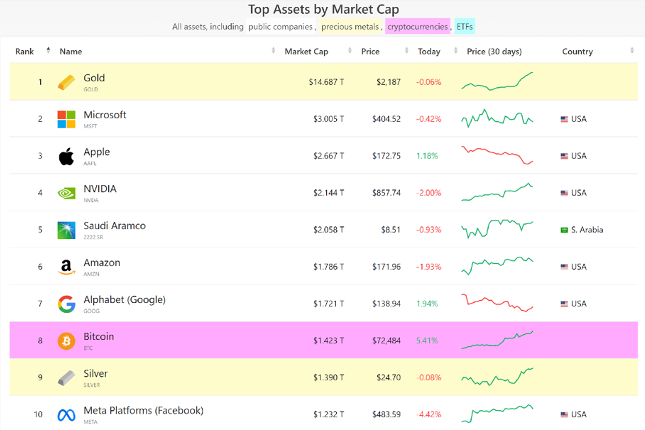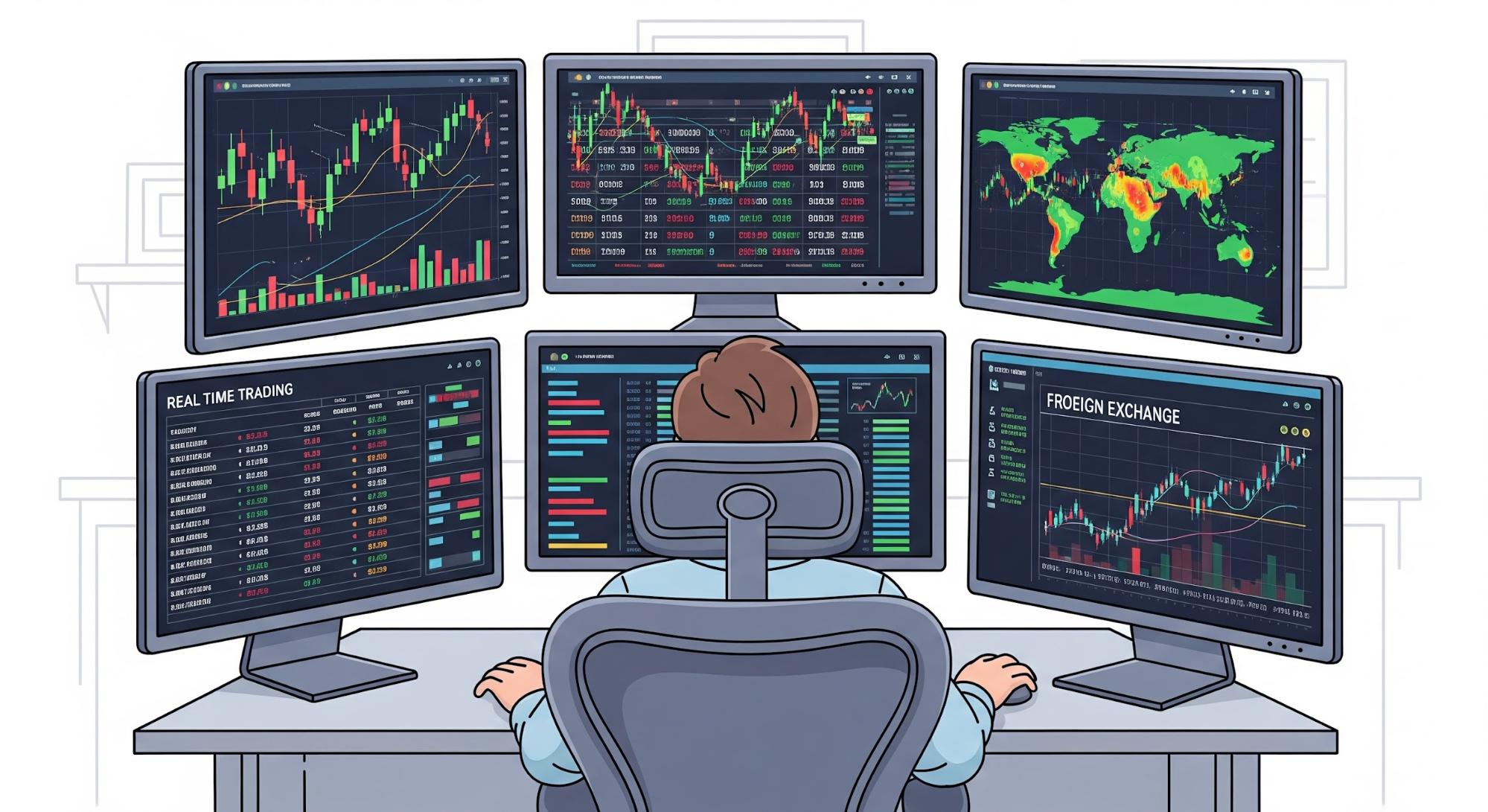
Posted March 14, 2024
By Sean Ring
Worth Its Weight In... Silver?
My friend and esteemed colleague Byron King hit another one out of the park. As you well know, Byron is a geologist, lawyer, and former naval aviator. His views are both well-rounded and well-substantiated.
That’s why this piece hit me so hard. Traders call this kind of analysis “relative value.” Relative value gives us an idea of where one asset trades against another. Sometimes, the difference or “spread” between the two assets makes sense. Sometimes it doesn’t. If the spread is too cheap and we expect it to widen, then we buy the spread. If the spread is expensive and we expect it to tighten, we sell it.
We usually do this with, say, US Treasuries versus German bunds. (Yes, the Germans can’t say “bond” properly, so it’s “bund.” They pronounce it boond.) Or you can trade Ford versus BMW.
Other traders like to look at intermarket trades, such as how stocks trade relative to bonds.
But what Byron harvested for us today? Something I wasn’t even thinking about.
Could something weightless, electronic, and doesn’t throw off cash flow be worth more than all the ancient Roman denarius from 221 BC until now?
Dear reader, Byron is about to clean your monetary clock.
Bitcoin Outshines Silver:Monetary Terra Incognita, or Perhaps Jurassic Park
Big news in both metals and crypto, and definitely for Bitcoin.
If you follow Bitcoin, you know it’s been on a tear lately. It's been up over 60% since the beginning of 2024. Not bad for a bunch of electrons.
At $60,000 just a few weeks ago, Bitcoin’s total value surpassed that of Warren Buffet’s Berkshire Hathaway. At over $72,000 the other day, Bitcoin’s market cap exceeded $1.4 trillion, which edges out the total value of global silver.
What does this mean? In monetary terms, we’re in terra incognita (an unknown land), or perhaps it’s something else, like Jurassic Park. So let’s think it through…
First, here’s the chart:
 Top ten assets ranked by market cap - CompaniesMarketCap.com.
Top ten assets ranked by market cap - CompaniesMarketCap.com.
Now, Some Background
What’s behind this chart? It’s basic math. Take all the Bitcoin out there, add them up, and multiply by the $72,000 price. There’s your $1.42 trillion.
By comparison, take all the silver in markets and inventories – for practical reasons, it must be an educated estimate – times the current price per ounce (about $24.20), and it’s about $1.39 trillion, which is less than that total for Bitcoin.
Everything changes over time, of course. Bitcoin doesn’t just go up-up-up, as anyone who has held it over the past couple of years can tell you, when it went down or traded in a range for weeks on end. But for now, of late, Bitcoin is rising.
Meanwhile, silver has also been on a rising trajectory (along with gold) based on widespread perceptions of continuing U.S. inflation and related government fiscal mismanagement. It’s a generational flight to safety among those with much to keep safe.
The long and short is that, right now, Bitcoin is the eighth largest financial asset in the world, larger even than Meta, formerly Facebook. And it’s the second largest commodity (loosely defined) after gold, which ranks far ahead at number one.
All things being equal – and things are never truly “equal” – if Bitcoin hits $85,000, it will be larger than Alphabet/Google; and if it tops $94,000, Bitcoin will be bigger than Amazon.
Bitcoin is big and getting bigger, but how should we think about this?
Terra Incognita, or Maybe Jurassic Park?
First, step back and consider what it takes to become one of the world’s largest financial assets. Some things are obvious.
Gold has over 5,000 years of recorded human history. Its use as a form of money dates back to ancient Samaria and before. So, gold is a no-brainer as a key financial asset and instrument.
Silver is in the same boat as gold. People have used silver for finance since time immemorial. Roman, Greek, Egyptian, Chinese, and other ancient coinages speak for themselves. The archaeology is there.
Indeed, silver has long been money. Just because President Lyndon Johnson removed silver from U.S. currency in 1965 doesn’t mean the metal has lost its roots in finance.
Now, look at another massive play on that list of ten market caps above: Saudi Aramco. Where’s the value there? In oil, of course, meaning in a useful and valuable form of energy.
Everybody in the world uses oil, and most people wish they could use more of it. It stands to reason that oil will be around for decades, if not centuries. If anyone tries to tell you that the modern oil age is over, zero-carbon, etc., just walk away because they are silly and don’t know what they’re talking about. (Long story; not now.)
In other words, gold, silver, and oil have value straight out of the ground. It’s easy to think of them as key elements of global finance.
Now, look at those other massive financial assets: Microsoft, Apple, Nvidia, Amazon, Alphabet and even Meta.
What’s the claim to financial fame for those companies? They’re tech plays, and it’s not like they have any history as sources or stores of value. They’re all less than fifty years old; for example, Microsoft was founded in 1975, and Apple in 1976. And the others are all even more recent.
As business concepts, the companies are built around a mix of digital hardware and software, with related sales operations underneath to create massive cash flow. But none of the tech companies have any roots as “money” by any classical definition. Nor do they make pretenses to be currencies.
Okay, we’ve covered nine names on that top ten market cap list, bringing us back to number eight, Bitcoin. And here’s that terra incognita: Is Bitcoin anything like the other nine names?
Does Bitcoin “sell” you something, like Amazon or Microsoft? No, you don’t buy books, sporting goods, or software from Bitcoin.
And Bitcoin is definitely not a microchip play like Nvidia, or an iPhone like Apple. Nor is it a relational database and search engine like Alphabet or Meta; Bitcoin doesn’t generate cash by sucking up all the advertising revenue in the world.
Meanwhile, Bitcoin does not produce energy like Saudi Aramco. Indeed, for the amount of, say, electrical energy required to “mine” just one Bitcoin (about 1.5Mw), you could melt about five tonnes of steel (about 300Kw each, more or less). This means that Bitcoin is a significant energy net user and not at all a net energy producer.
To be sure, Bitcoin is not gold or silver. It’s not tangible. It has no mass. It’s not even fungible in the sense that an ounce of pure gold or silver is the same as any other ounce, not including metal shaped into coins, of course. In other words, there’s no Bitcoin on the periodic chart.
According to Investopedia, Bitcoin is a “virtual currency designed to act as money and a form of payment outside the control of any one person, group, or entity, thus removing the need for third-party involvement in financial transactions.”
In other words, Bitcoin is a mix of energy and computing power applied to blockchain code. In the end, it’s electrons in a storage device (your Bitcoin wallet, so to speak), leading to a defined, unique, and specific item within the digital ecosphere.
The current cachet of Bitcoin is that it’s a form of payment, which presumes that a market system sets prices for real goods, and people will transact for those goods in this virtual currency. Well, okay, but so much for eliminating “third-party involvement.”
All this, and Bitcoin is quite new to the world, conceived way back in… (checks notes)… 2009. That’s not exactly the deep historical pedigree of gold, silver, or oil. And the other large market cap plays listed above are actual businesses that predate at least 2009, even the current chipmaking darling Nvidia.
As financial instruments go, and in terms of valuing an asset, Bitcoin is not just a new kid on the block, it’s an unknown play or terra incognita. And it’s probably not out of bounds to wonder if there’s a (metaphorical) Jurassic Park behind the wires here.
What Could Go Wrong?
Right now, lots of people are making a lot of money in a hurry from Bitcoin, right? So what’s the problem?
Begin with the idea that when lots of people make a lot of money in a hurry from the same idea, there might just be problems.
First comes Bitcoin's energy-intensive angle, noted above. Again, you can melt five tonnes of steel with the same electricity required to mine one Bitcoin. That’s a lot of electrons.
So, one problematic issue is that Bitcoin – along with other cryptos, and definitely with artificial intelligence (AI) – is among the growing players for access to downstream electrical loads on the U.S. and global grid. And that electricity must come from somewhere.
On the plus-side, people have come up with innovative energy methods for mining Bitcoin. They use solar power out in the desert; or burn “stranded” natural gas in far-off oilfields to power computer banks; or they set up shop in Iceland with its ample geothermal power.
But the point is that Bitcoin uses high levels of energy in a world where energy is becoming more difficult to produce in amounts that nations and continents demand.
Then we get to the issue of degraded power grids across the world, which in the U.S. means a system that’s generally old and maxed out. In the U.S., this growing power demand is absolutely a problem. Cryptos like Bitcoin (and related energy demands like AI) are about to super-strain the grid, leading to brownouts and blackouts.
Move on to the communication and financial system required to utilize Bitcoin. Yes, we have the Worldwide Web, undersea cables, overhead satellites, and more. But if you’re looking for a way not to involve third parties in transactions, this isn’t it. In so many ways, the fate of your Bitcoin is in the hands of others.
The world is filled with pitfalls to global communication, both accidental and intentional; the cut communications cables at the bottom of the Red Sea stand out, for example.
The takeaway on this energy point is that storing and accessing your Bitcoin will require more than minimal third-party reliance.
And now we arrive at the Tyrannosaurus Rex of Jurassic Park, to cultivate that metaphor I laid out before: What happens when governments want in on the action? Because it’s foolish to think that Bitcoin is some sort of unbreakable code. There’s no such thing.
The biggest and best codebreakers in the world work for the likes of the U.S. government at the National Security Agency, if not counterparts in Russia, China, and other locales. Sooner or later, someone somewhere will figure out how to pickpocket your crypto wallet.
Perhaps the government's touch will be benign, in the form of merely taxing your wealth or just the “gains,” as defined by tax-writing bureaucrats. Or perhaps things will be darker, and some government actor will wage electronic warfare on you and your Bitcoin just because they can. You never know, right? (Ask a Canadian Trucker whose bank accounts were seized.)
One way or another, you should accept the fact that, sooner or later, Bitcoin will come within government reach if not under government control.
This is not to say don’t swim in the Bitcoin pool. It’s to remind you that this electronic creation has come along fast, in a tumultuous time of monetary and fiscal irresponsibility, certainly by the U.S. government. Understandably, many people want to escape from the hand of the government; however, it’s just too bad that the government thinks differently. (Vote harder, I guess.)
As everything plays out, how will Bitcoin remain denominated? In dollars? In other foreign currencies? Well, if that’s the case, then it’s back to playing in the government sandbox.
Meanwhile, think outside the Western box here. Russia, China, and many other nations are accumulating gold and silver, and they, too, can do blockchain accounting.
So what happens when those nations decide to pool their metal holdings and back each ounce with a blockchain code, essentially establishing their own gold-backed cryptocurrency? Perhaps a digital, gold-backed ruble or yuan.
Well, overnight your code-backed Bitcoin will have to compete against a gold-backed electronic currency. And that pulls the plug on a key aspect of maintaining underlying value.
Something Big, But…
To sum up, yes, many people are doing well with Bitcoin. And yes, Bitcoin just overtook silver in terms of market cap. Something big is happening.
But this big Bitcoin thing is also a new financial thing with no real history.
Don’t be myopic or target-fixated on Bitcoin. In the big scheme, we’re all up against traditional gold, silver, and oil, as well as geopolitical competition from other nations that may not want to play by the Western rules anymore.
If you’re doing well with Bitcoin, enjoy the ride. But all rides come to an end. And don’t forget to buy into the sturdy old classics, gold and silver, with their millennia of heritage.
That’s all for now. Thank you for subscribing and reading.

It's Been a Metals Year... and a Pick!
Posted January 02, 2026
By Sean Ring

The U.S. Equity Indices and What They Mean
Posted December 30, 2025
By Sean Ring

The Shape of Things to Come
Posted December 29, 2025
By Jim Rickards

A Copper Melt-Up in 2026, and “Tech” Meltdown
Posted December 26, 2025
By Byron King

Bonding Over Christmas
Posted December 25, 2025
By Sean Ring

